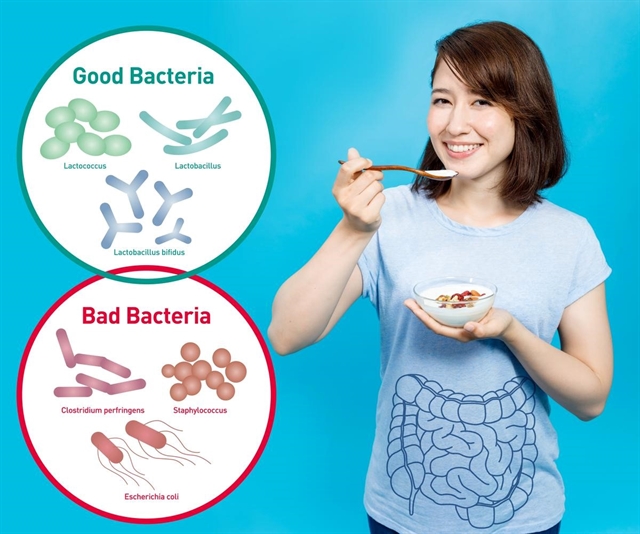 Life & Style
Life & Style


|
| Dr Mattias Larsson. Photo courtesy of Family Medical Practice |
by Dr Mattias Larsson*
If you did not know it – you are more bacteria than human! That is if we look at the number of cells. The human body is home to trillions of microorganisms, collectively known as the microbiome. These tiny inhabitants reside mainly in the gastrointestinal tract, but also populate other areas like the skin, mouth, and reproductive organs. The intestinal microbiome includes approximately 500-1,000 species whose collective genomes are estimated to contain 100 times more genes than our own human genome.
In Vietnamese there are two words for bacteria vi khuẩn - the pathogens that cause disease, and lợi khuẩn - the good bacteria. The good bacteria that live in symbiosis with us, in us and on us, and that are necessary for our survival. The microbiome is a complex and diverse ecosystem comprising lợi khuẩn, viruses, fungi, and other microorganisms. When it is in a state of balance, it can support several essential bodily functions. These include digestion, synthesising vitamins, regulating the immune system, and preventing the growth of harmful vi khuẩn. Additionally, the microbiome plays a crucial role in maintaining the integrity of the gut lining, which is vital for overall gut health.

|
| There are two types : vi khuẩn- the pathogens that cause disease, and lợi khuẩn - the good bacteria. Photo shutterstock.com |
The incidence of allergies, such as asthma, eczema, hay fever, and food allergies, has been on the rise over the past few decades. Researchers have found intriguing links between the microbiome and the development of allergies. The early-life establishment of the microbiome seems to play a pivotal role in shaping the immune system's response to potential allergens.
Children born through natural birth are exposed to their mother's vaginal and fecal microbiota, which begins the colonisation of their gut. On the other hand, babies born via C-section are colonised by microbes from the hospital environment, which can differ significantly from a vaginal birth. Studies have shown that children born via C-section might have a higher risk of developing allergies and being colonised by vi khuẩn compared to those born vaginally.
Additionally, the diversity and composition of the gut microbiome during infancy and early childhood have been linked to the development of allergies later in life. An environment that is too clean might not expose the intestinal tract and immune system to enough diversity and stimulation, it then starts to react on substances that don’t pose a threat to the body, such as pollen or various different food items. A lack of microbial diversity and an imbalance of certain bacterial species, particularly during the first years of life, can lead to an increased risk of allergic conditions. Research has shown that Sweden, a high-income country, has higher rates of allergies compared to Estonia, a middle-income country, with a similar climate.
The gut microbiome may influence the development and progression of various diseases including inflammatory bowel disease (IBD), obesity, type 2 diabetes, cardiovascular disease, and certain types of cancer. The gut-brain axis, a communication network between the gut and the brain, is modulated by the microbiome where imbalance can affect mental health, increasing the risk for conditions like depression, anxiety, and even neurological disorders like Alzheimer's disease.
Antibiotics are powerful medications designed to combat bacterial infections. However, antibiotics kill both lợi khuẩn and vi khuẩn. The overuse and misuse of antibiotics have become a global health concern, as some bacteria have developed antibiotic resistance. Bacteria can share resistance genes though plasmids, just like programs can be transferred between computers. These genes can spread among both lợi khuẩn and vi khuẩn turning the microbiome into a pool of antibiotic resistant bacteria. In Việt Nam we have found that there is a high rate of colonisation and disease with multi resistant superbugs, please see previous articles in Việt Nam News. It is crucial for healthcare professionals to use antibiotics judiciously, prescribing them only when necessary and considering potential alternatives whenever possible.
The human microbiome is an intricate ecosystem that profoundly influences health and disease. Its role in modulating immune responses – protecting against allergies, and contributing to disease susceptibility – highlights the importance of nurturing this delicate balance through various means, including prudent antibiotic use, can have a significant impact on overall health and well-being.
Family Medical Practice
*Dr Mattias Larsson is a pediatric doctor at Family Medical Practice and associate professor at Karolinska Institutte and has a long experience in research on infectious diseases. He has worked with the Oxford University Clinical Research Unit and the Ministry of Health of Việt Nam. He is fluent in English, Swedish, Vietnamese, German and some Spanish.
Visit Family Medical Practice Hanoi 24/7 at 298I Kim Mã street, Ba Đình, Hà Nội.
To book an appointment, please call us at (024).3843.0784 or via Whatsapp, Viber or Zalo on +84.944.43.1919 or email hanoi@vietnammedicalpractice.com.
FMP’s downtown location in Hồ Chí Minh is in Diamond Plaza, 34 Lê Duẩn ave., Bến Nghé, district 1, and 95 Thảo Điền ave., district 2. Tel. (028) 3822 7848 or email hcmc@vietnammedicalpractice.com.




